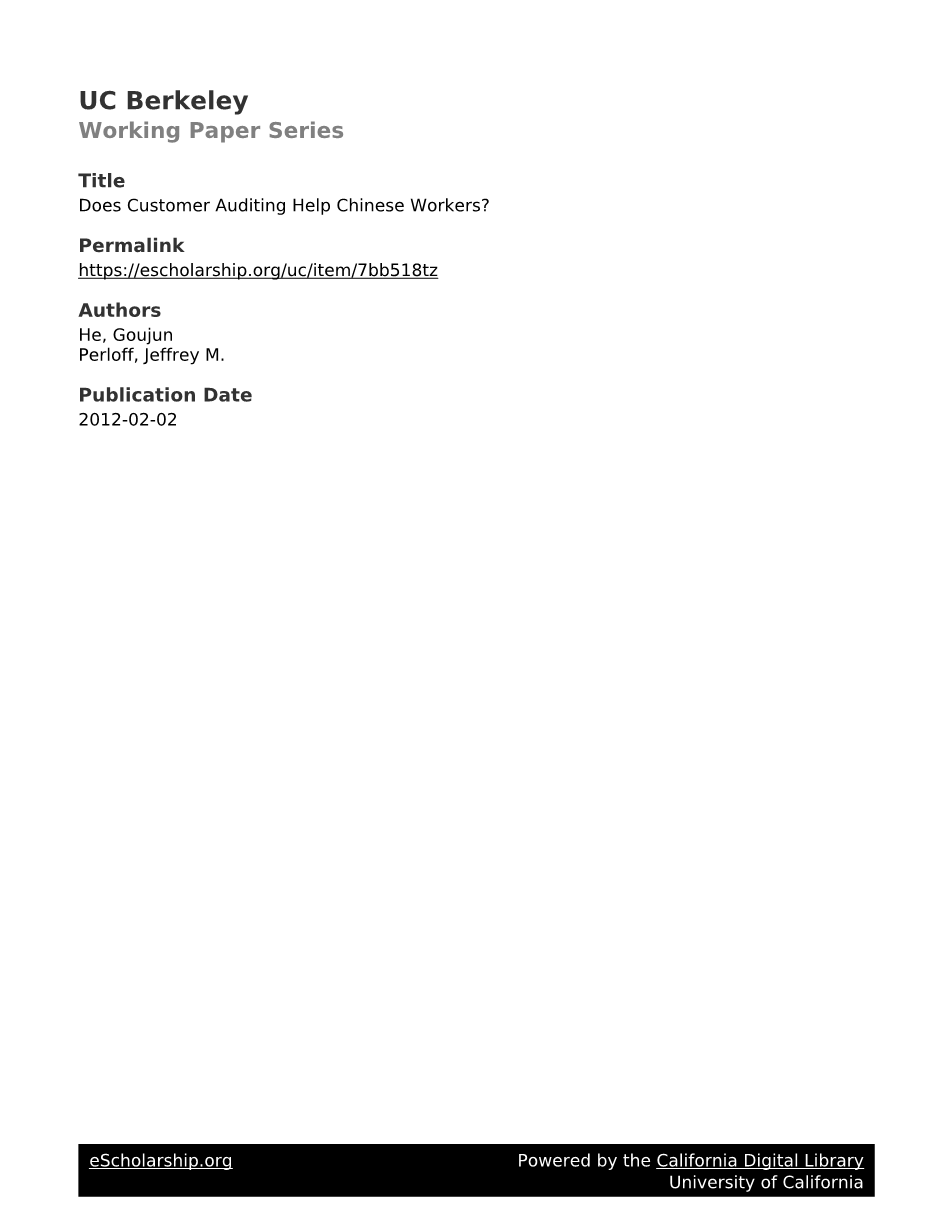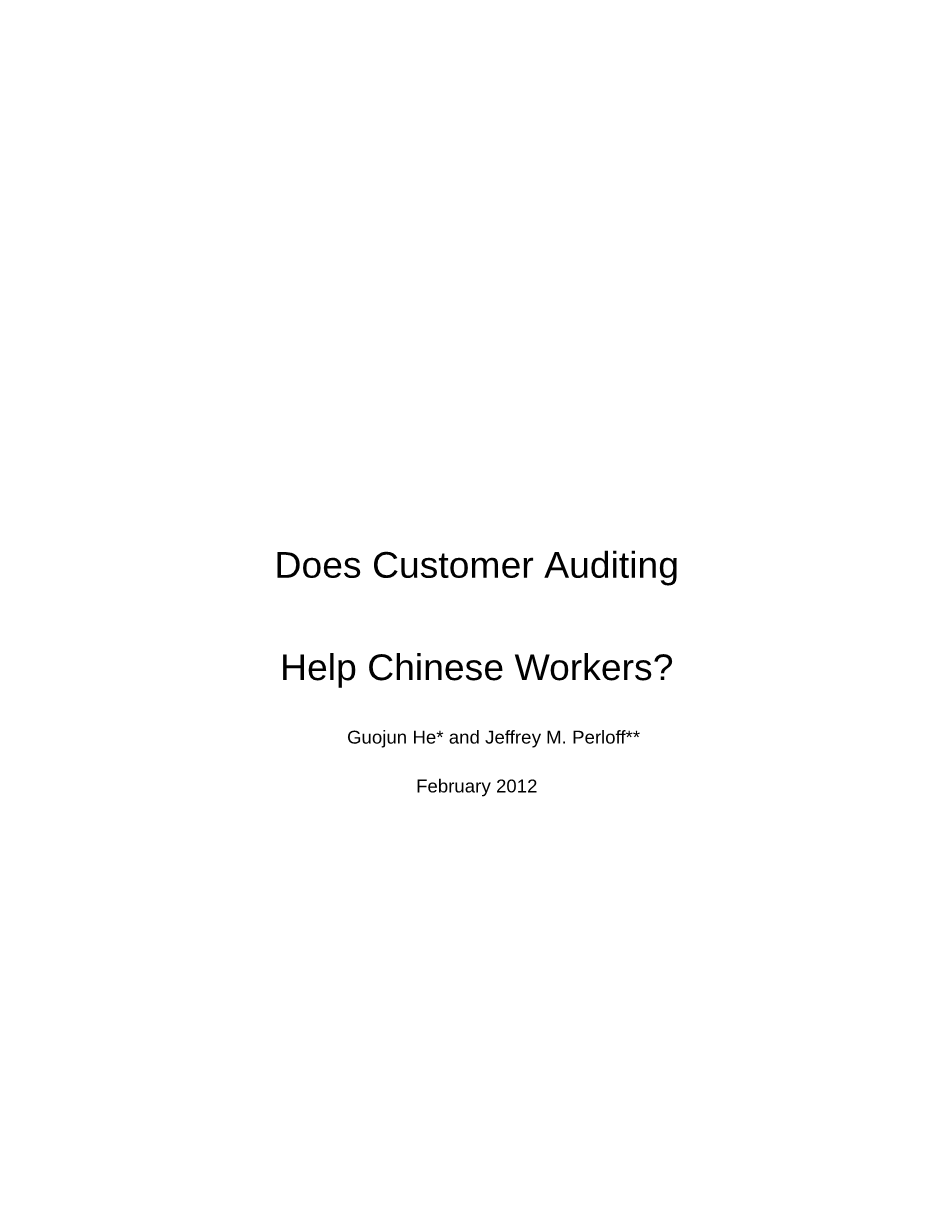英语原文共 34 页
Does Customer Auditing Help Chinese Workers?
Guojun He* and Jeffrey M. Perloff** February 2012
Abstract
Auditing by downstream firms has limited effects on Chinese firmsrsquo; adherence to labor standards and other measures of blue collar workers well-being. Auditing does not affect the suppliersrsquo; blue-collar employeesrsquo; wages, probability of belonging to a union, or likelihood of working overtime. However, audited firms are more likely to provide rural migrant workers pensions, business medical insurance, and unemployment insurance.
Introduction
Does auditing by downstream firms affect how Chinese firms treat their workers? Using a large sample of firms from the National Bureau of Statistics of Chinarsquo;s Private Sector Survey of China, we investigate the relationship between customer auditing and Chinese blue-collar workersrsquo; welfare. When we examine the relationships between auditing and welfare measures for all employees, we find little evidence that auditing affects the firmsrsquo; adherence of labor standards and raises workersrsquo; overall welfare. However, if we focus on how firms treat their most disadvantaged workers, rural migrants, we find that rural migrants in audited firms receive statistically significant higher pensions and medical and unemployment insurance.
Newspapers regularly report how Western firms, responding to public outcry in their own countries, pressure Chinese manufacturers to raise labor standard. For example, in 2012, Apple pressured Foxconn Technology Group to improve working conditions and raise pay at its Chinese factories, where it manufactures iPhones and iPads. Academics, labor activists, and non-government organizations have extensively documented labor rights violations in China over the last decade (e.g., Diamond 2003, Pringle and Frost 2003, Compa 2004, Cooke 2005). Since the late 1990s, multinational corporations have developed a variety of Corporate Codes of Conduct (CCC) as well as many auditing and monitoring mechanisms to check whether their suppliers, particularly in developing countries, comply with labor standards.1 Many of these groups urge companies that buy from Chinese suppliers to audit their treatment of workers.
However, few studies have investigated the impacts of customer auditing, and none as far as we know have examined the effects on Chinese firms extensively. The existing studies generally find that auditing has very limited effect on workersrsquo; welfare. For example, Locke, et al. (2007) analyzed its impacts on the improvement of working conditions using the data of Nikersquo;s suppliers in 51 countries. Their analysis suggests that Nikersquo;s efforts and investment on monitoring only produce little effects. Barrientos, et al. (2007) examined the impacts of corporate codes of labor practice on workers based on evidence from the UK Ethical Trading Initiative. They find that corporate codes may play a role in improving labor standards, but are currently doing little to challenging existing practices and social relations. Locke, et al. (2010) further compared two Mexican factories, and concluded that working conditions and labor standards are mainly the product of divergent patterns of work organization and human resource management and not of customer auditing.
We extend the existing literature by examining the effect of auditing in China, by using more extensive measures of workersrsquo; well-being, and by using more formal statistical analyses. We analyze data from the China Center for Economic Research at Peking Universityrsquo;s Private Sector Survey of China. We investigate the relationship between customer auditing and seven measures of Chinese blue-collar workersrsquo; welfare: presence of labor unions, working overtime, hourly wage, pension coverage, government-sponsored medical insurance coverage, business medical insurance coverage, and unemployment insurance coverage.
In the first section, we discuss the literature on labor conditions in China. The second section describes auditing by downstream firms. We then present our hypotheses concerning the relationship between auditing and labor welfare. The fourth section describes the survey. The following section discusses the models that we use to test the relationship between customer auditing and blue-collar workers welfare. The next section presents our empirical result. It is followed by a section on robustness checks. In the final section, we summarize the paper and draw conclusions.
Literature on Working Conditions in China
According to the literature on Chinese labor markets, many Chinese blue-collar workers are subject to labor law violations and are not treated as well as many Corporate Codes of Conduct require. Many Chinese firms ill-treat workers by paying low wages, violating their freedom of association, and requiring substantial overtime work without compensation Diamond 2003, Compa 2004).
Freedom of association is an important labor standard in International Labor Organization (ILO) Core Conventions and in various Corporate Codes of Conducts. Several studies conclude that Chinese workers fare better if they are represented by labor unions. For example, Yao and Zhong (2010), using the same data set that we employ, found that labor unionization is associated with a 5.6% higher hourly wages, 1.4% fewer monthly hours of work, and a 12.3% greater pension coverage.
Chinese labor law requires that laborers work for no more than 8 hours a day and no more than 44 hours a week on average, and that workers should be paid more if they do work longer hours. However, due to the governmentrsquo;s limited ability or unwillingness to enforce labor protection regulations, many firms require laborers to work extra hours for little or no extra r
资料编号:[4479]
以上是毕业论文外文翻译,课题毕业论文、任务书、文献综述、开题报告、程序设计、图纸设计等资料可联系客服协助查找。




